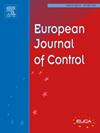Linear quadratic optimal control and zero-sum game for uncertain time-delay systems based on pessimistic value
IF 2.5
3区 计算机科学
Q2 AUTOMATION & CONTROL SYSTEMS
引用次数: 0
Abstract
The pessimistic value is an important criterion distinct from the expected value, suitable for addressing uncertain optimization. This paper studies the linear quadratic optimal control problem and zero-sum game for uncertain time-delay systems based on the pessimistic value. First, we introduce an uncertain time-delay system and formulate the associated optimal control problem. By using algebraic transformation methods, we convert the time-delay problem into an equivalent uncertain optimal control problem without time delay. We then propose a recursive equation that transforms the uncertain optimal control problem into a backward difference equation and provide the analytical solution for the uncertain linear quadratic optimal control problem. Within this framework, we extend the main results to a linear quadratic zero-sum game and propose the corresponding solution algorithm. Finally, we demonstrate the algorithm’s solving process through numerical simulations, further verifying the applicability of our findings.
基于悲观值的不确定时滞系统线性二次最优控制与零和博弈
悲观值是区别于期望值的重要准则,适用于不确定性优化问题。研究了基于悲观值的不确定时滞系统的线性二次最优控制问题和零和博弈问题。首先,我们引入了一个不确定时滞系统,并给出了相应的最优控制问题。利用代数变换方法,将时滞问题转化为一个等价的不确定无时滞最优控制问题。然后提出了将不确定最优控制问题转化为后向差分方程的递推方程,并给出了不确定线性二次最优控制问题的解析解。在此框架下,我们将主要结果推广到线性二次零和博弈,并提出了相应的求解算法。最后,通过数值模拟验证了算法的求解过程,进一步验证了研究结果的适用性。
本文章由计算机程序翻译,如有差异,请以英文原文为准。
求助全文
约1分钟内获得全文
求助全文
来源期刊

European Journal of Control
工程技术-自动化与控制系统
CiteScore
5.80
自引率
5.90%
发文量
131
审稿时长
1 months
期刊介绍:
The European Control Association (EUCA) has among its objectives to promote the development of the discipline. Apart from the European Control Conferences, the European Journal of Control is the Association''s main channel for the dissemination of important contributions in the field.
The aim of the Journal is to publish high quality papers on the theory and practice of control and systems engineering.
The scope of the Journal will be wide and cover all aspects of the discipline including methodologies, techniques and applications.
Research in control and systems engineering is necessary to develop new concepts and tools which enhance our understanding and improve our ability to design and implement high performance control systems. Submitted papers should stress the practical motivations and relevance of their results.
The design and implementation of a successful control system requires the use of a range of techniques:
Modelling
Robustness Analysis
Identification
Optimization
Control Law Design
Numerical analysis
Fault Detection, and so on.
 求助内容:
求助内容: 应助结果提醒方式:
应助结果提醒方式:


